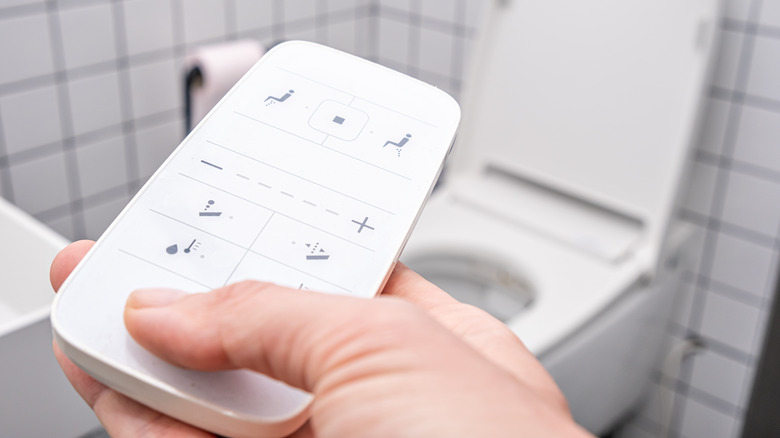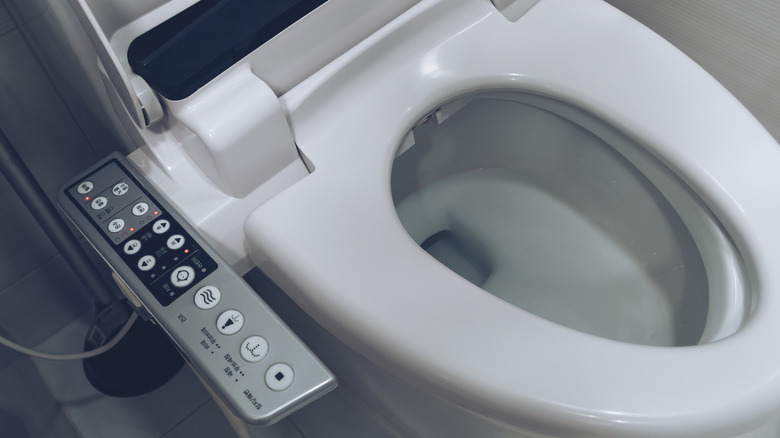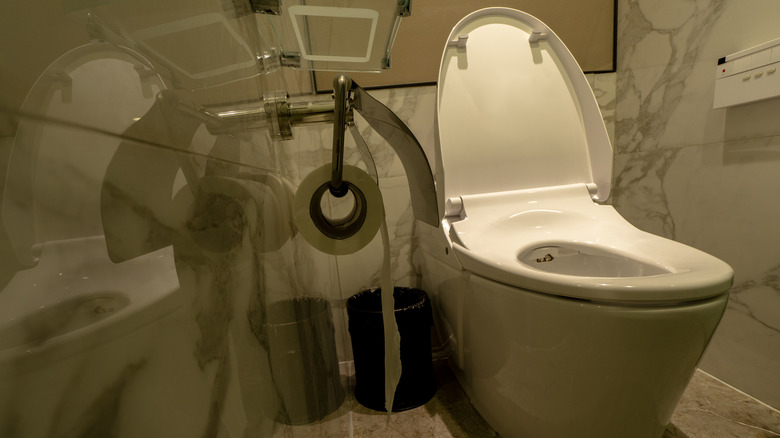Are Smart Toilets Worth It?
Toilets, as most people and a few well-trained pets on YouTube seem to know, are basic necessities in modern homes. If they're not overflowing and flush properly, we don't think much about them beyond regular cleaning. After all, considering the purpose of our trusty toilets, how advanced do they have to be? As it turns out, if you're into adding luxury to every corner of your home, they can offer extreme pampering that goes beyond any traditional toilet or bidet. Are smart toilets worth it, though? If you can afford them, yes.
While elevating using the toilet to a comforting experience has been a thing in Japan for decades, the practice of adding smart toilets to homes has been spreading around the world in recent years. The market for smart toilets, in fact, could reach $13.5 billion by 2028, as predicted by Business Wire. If you're still wondering what all the fuss is about with this aspect of smart plumbing, exploring the features these toilets offer might win you over to team smart. And, of course, you'll want to learn about all the drawbacks of smart toilets before racing out to purchase one.
Smart toilet features to consider
If you're a fan of commodes that flush automatically, the smart toilet could be a welcome addition to your home. Most have settings that either flush when you get up and walk away or activate when a hand is waved in front of a sensor. Either way, no-touch flushing is far less germy than using an old-fashioned handle.
Smart toilets can also ease your home's water consumption by automatically judging how much is needed for each type of flush. That can mean saving as much as a gallon of water with every flush. Depending on where you live, this can help your household budget and may also contribute to water conservation efforts in your community. Sensors to prevent overflowing are also built into most smart toilets.
Other pampering features include bidets with warm water and massage options, air drying systems, and heated seats. Built-in air fresheners and self-cleaning features are also appreciated by most smart toilet fans, and if you want to listen to music while you're in the powder room, they're Bluetooth-ready as well. Lastly, while you might not think a nightlight in the loo is a big deal, you might find that not having to turn the light on to go at night is a sleep game changer. All these things combined can make a smart toilet worth the splurge.
Drawbacks of smart toilets
As with other smart gadgets, toilets with tech require power to make them work. You can hard wire them into your home or buy a model that uses batteries. Hooking a smart toilet up to your home's electrical system is more of a set-it-and-forget-it way to go. It does mean you'll have to get an electrician to assist you, though, which adds to the overall expense. Battery-operated smart toilets might be a better choice, but you will have to change out the batteries from time to time to keep the toilet operational.
Smart toilets are also initially more expensive than regular toilets, so that can be the bottom line when determining if snagging one is worth the splurge. You can buy a basic toilet at your local warehouse store in the $100-200 range. If you want to go smart, you can expect to pay exponentially more. Most full-function smart toilets sell for over $1,000, and some brands can go for several times that depending on the features they incorporate. Want a compromise? Think about adding a bidet toilet seat to a regular toilet. You can still have the comfort of a heated seat, warm water cleansing, and air drying while saving a good chunk of change.


